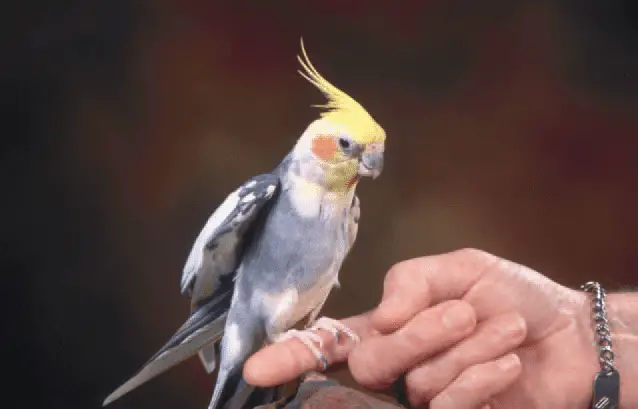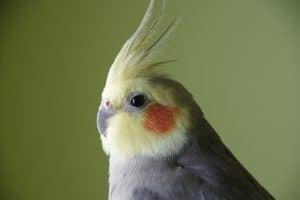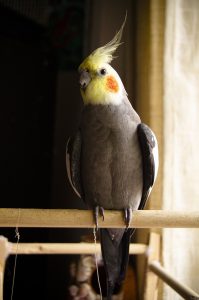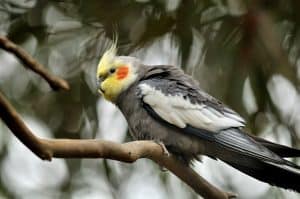As a devoted pet owner, the health of my feathered friends always takes top priority. Recently, a question popped up in my mind: “Can you catch avian flu from your cockatiel?” It’s a concern that could make any bird owner’s heart skip a beat, considering the close bond we share with our pets. Avian flu, known for its impact on birds, has made headlines for its potential to affect humans as well. But how worried should you really be when it comes to your beloved cockatiel?
Navigating through the sea of information online can be daunting. That’s why I’ve taken it upon myself to dive deep into this topic, distilling complex veterinary and health information into something you can understand easily. Let’s explore together whether our feathered companions pose any real risk to our health, or if this is just another case of misinformation causing unnecessary panic.
Understanding Avian Flu
Avian flu, or avian influenza, is a highly contagious viral disease prevalent among bird species. In this section, I will clarify what avian influenza is and how it transfers among birds.
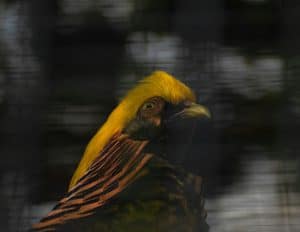
Overview of Avian Influenza
Avian influenza is an infectious disease commonly found in birds, both wild and domesticated. The disease is caused by infection with avian influenza Type A viruses. These viruses occur naturally among wild aquatic birds worldwide and can infect domestic poultry and other bird and animal species. Avian flu viruses do not normally infect humans.
There are various strains of avian influenza viruses which can vary from mild to severe in terms of the symptoms they produce in birds. The milder strains may cause only mild symptoms or go undetected, while the more severe strains can cause severe disease and sudden death in birds. This variability can sometimes complicate detection and management of the disease.
How Avian Flu Spreads Among Birds
The transmission of avian flu among birds occurs through direct contact with infected birds or through contact with surfaces contaminated by their secretions, such as saliva, nasal secretions, and feces. Avian flu spreads quickly and easily among birds, making it a significant concern for places with high bird populations like poultry farms and wildlife habitats.
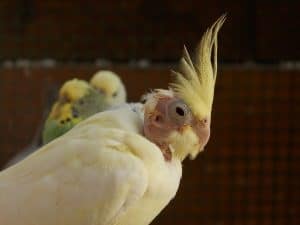
Infected wild birds, especially migratory birds, play a crucial role in the spread of avian flu. They can carry the virus across long distances and spread it to domestic poultry and other birds they come in contact with.
Such interactions increase the risk of avian flu outbreaks, which can devastate poultry farms, impact on the availability of chicken and other poultry products, and pose a potential, though rare, risk to human health. Moreover, infected birds can shed the virus through their droppings, contaminating the food and water bowls of other birds.
Understanding how avian influenza spreads among birds and identifying the signs of infection are key steps towards implementing effective preventive measures to protect both wild and domesticated birds.
Avian Flu and Cockatiels
Exploring the relationship between cockatiels and avian flu involves understanding how this highly contagious viral disease can affect these popular pet birds. Avian influenza, or bird flu, poses significant health risks to both birds and potentially humans, if not monitored and managed properly.
Identifying Symptoms in Cockatiels
Identifying symptoms of avian flu in cockatiels is critical for early detection and effective management. Key symptoms to watch for include:
- Respiratory Issues: Cockatiels may exhibit signs of respiratory distress such as wheezing, cough resembles a short toy horn, or labored breathing.
- Change in Behavior: Infected birds often show reduced activity levels, appear lethargic, or less responsive to human interaction.
- Physical Changes: Look for swelling around the eyes, a change in the color or condition of the feathers, and purple discoloration of the wattles and combs.
- Gastrointestinal Symptoms: These might include diarrhea or changes in food and water intake.
- Sudden Death: In some cases, avian flu can lead to sudden death in birds, highlighting the severity of this viral infection.
Awareness of these symptoms allows bird owners to seek immediate advice from an avian vet, potentially saving their pet’s life and preventing the spread of the virus.
Risk Factors for Cockatiels
Several factors increase the risk of avian influenza transmission to cockatiels, including:
- Contact with Wild Birds: Interaction with wild birds or exposure to environments frequented by wild birds is a common transmission route.
- Contaminated Surfaces: Virus particles can reside on food and water bowls, cages, or other shared surfaces. Regular disinfection is imperative.
- Proximity to Infected Birds: Being near other birds that are infected significantly raises the likelihood of spreading the virus.
- Outdoor Housing: Cockatiels housed outdoors are at a higher risk of coming into contact with wild birds or their droppings.
Mitigating these risks involves preventive measures such as keeping pet birds indoors, ensuring cleanliness, and minimizing contact with potentially infected wild birds or environments. Monitoring these risk factors closely ensures a safer environment for cockatiels and helps prevent the spread of avian flu within both wild and domestic bird populations.
Human Risk from Avian Flu
As a blogger deeply immersed in pet care and health issues, I often explore how diseases affect both animals and their owners. Today, I’m delving into whether humans can contract avian flu from cockatiels and the precautionary measures pet bird owners should take.
Can You Catch Avian Flu From Your Cockatiel?
Humans catching avian influenza from a cockatiel is extremely rare, but not impossible. The avian flu virus primarily spreads among birds, but on rare occasions, it can cross species. If my cockatiel contracted avian flu, primarily through contact with infected wild birds or contaminated environments, there is a slight risk it could transmit the virus to me.
Transmission to humans usually requires close contact with sick birds, handling birds in a way that exposes me to high concentrations of the virus, or direct contact with diseased tissues and waste.
Research indicates that the primary transmitters of the avian flu virus to humans are usually domestic poultry like chickens and ducks, rather than pet birds. However, knowing that avian flu is a highly contagious viral disease prompts me to remain cautious and vigilant.
Precautionary Measures for Pet Bird Owners
Ensuring the health and safety of pet birds reduces the risk of avian flu transmission. Here are some preventive measures I’d adopt:
- Regular Screening: Regular visits to an avian vet help in early detection and management of avian flu symptoms in pet birds.
- Isolation from Wild Birds: As infected wild birds are common carriers, it’s essential to prevent contact between my pet and any wild birds. Keeping my cockatiel indoors is an effective way to minimize this risk.
- Sanitation: Maintaining cleanliness of the living space, including changing food and water bowls daily, disinfecting living areas, and ensuring the bird’s environment is clean, limits the spread of the virus.
- Hygienic Handling: Washing hands before and after handling birds, as well as using protective clothing, can prevent cross-contamination.
By following these guidelines, pet bird owners like myself can greatly reduce the chances of avian flu affecting our cherished birds and potentially, ourselves.
Keeping Your Cockatiel Healthy
Maintaining your cockatiel’s health is crucial in minimizing the risk of diseases like avian flu. I’ll share some essential preventive measures and advice on when to consult a veterinarian to ensure your pet remains in excellent health.
Preventive Practices for Avian Flu
To safeguard your cockatiel against avian influenza, I’ve outlined key practices that are effective in preventing this viral infection:
- Hygiene and Sanitation: Regularly clean and disinfect your bird’s living area, including food and water bowls. This ensures there’s no accumulation of waste, which can harbor viruses and other pathogens.
- Limit Contact With Wild Birds: Since many avian flu cases arise from interactions with infected wild birds, it’s essential to prevent your cockatiel from coming into contact with wild birds. Keeping your cockatiel indoors or in a secure outdoor enclosure can help mitigate this risk.
- Regular Health Checks: Schedule routine health assessments with a veterinarian specializing in birds. These checks help catch and address potential health issues before they escalate.
These preventative measures do not just reduce the risk of avian flu but also ensure the overall well-being of your cockatiel.
When to Consult a Veterinarian
Knowing when it’s time to see the veterinarian can be the key to preventing severe disease in your cockatiel. Here are signs that require immediate attention:
- Changes in Behavior: If your cockatiel shows less activity, decreased vocalization, or altered eating habits, these might indicate illness.
- Physical Symptoms: Symptoms like respiratory distress, changes in fecal matter, or feather plucking are severe enough to warrant a veterinarian visit.
- After Exposure: If you suspect your cockatiel has been in contact with sick birds or an environment contaminated with the flu virus, consult your local veterinarian without delay.
By staying vigilant and responsive to these indicators, you can ensure swift action if avian influenza or any other health issue threatens your pet bird.
Understanding the dynamics of avian flu in cockatiels has shown that while the risk of transmission to humans is low it’s not impossible. I’ve highlighted the importance of maintaining strict hygiene and regular veterinary checks to minimize any risks.
As a pet owner it’s crucial to stay informed and proactive about your bird’s health. By implementing the recommended preventive measures you can enjoy a healthy relationship with your cockatiel without undue worry about avian flu.
Frequently Asked Questions
How can avian flu be transmitted from cockatiels to humans?
Avian flu can be transmitted from cockatiels to humans through close contact with infected birds or their surroundings. This includes handling the birds, their waste, or surfaces they have contacted.
What are the symptoms of avian flu in humans?
Symptoms of avian flu in humans can include fever, cough, sore throat, muscle aches, and sometimes severe respiratory issues like pneumonia.
Are all bird species equally susceptible to avian flu?
No, different bird species have varying susceptibilities to different strains of avian flu. Cockatiels, like other bird species, can contract avian flu, but the risk of transmission to humans is rare.
What precautions can pet bird owners take to prevent avian flu?
Pet bird owners should practice good hygiene, keep their birds isolated from wild birds, ensure regular veterinary check-ups, and maintain clean and sanitized living environments for their birds.
When should a bird be taken to a vet for suspected avian flu?
A bird should be taken to a vet if it shows signs of illness such as respiratory issues, changes in behavior, or decreased appetite. Immediate veterinary attention is crucial in preventing the spread of the disease.
How does avian flu impact the health of a cockatiel?
Avian flu can severely affect a cockatiel’s health, potentially leading to respiratory distress, behavioral changes, and in severe cases, death. Immediate veterinary care can help manage symptoms and prevent complications.
Can improving hygiene practices reduce the risk of avian flu in pet birds?
Yes, improving hygiene practices such as regularly cleaning cages, using appropriate disinfectants, and practicing good personal hygiene can significantly reduce the risk of avian flu in pet birds.
If you’re a dedicated cockatiel owner looking to enhance the well-being of your feathered friend, be sure to dive into these insightful articles. Discover the most suitable greenery for your pet’s habitat in “The Best Plants for Cockatiel Cages,” ensuring a safe and stimulating environment.
Curious about dietary options? “Can Cockatiels Eat Bean Sprouts?” and “Can Cockatiels Eat Leeks?” provide essential nutritional guidance. Additionally, address potential hazards with “Can Cockatiels Eat Newspaper?” and learn about the hidden dangers in “Are Paint Fumes Bad for Cockatiels?.” Each article is packed with expert advice to keep your cockatiel happy and healthy.
